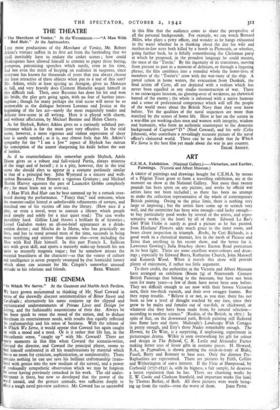THE CINEMA
"In Which We Serve." At the Gaumont and Marble Arch Pavilion.
WE have grown accustomed to thinking of Mr. Noel Coward in terms of the shrewdly discreet sentimentalities of Bitter Sweet and Cavalcade • alternatively his name conjures up the clipped and sophisticated understatements of Private Lives and Design for Living, and the fashionable neuroticisms of their day. Always he has been quick to sense the mood of the nation, and to deduce therefrom its entertainment needs, with results that equally reflected his craftsmanship and his sense of business. With the release of In Which We Serve, it would appear that Coward has again caught 111) with a mood and a need. Or is it rather that life has, in the transatlantic sense, " caught up " with Mr. Coward? There are Many moments in this film when Coward the scenario-writer, Coward the director, and Coward the principal player, seems to find himself confronted in all his manifestations by material which leaves no room for cynicism, sophistication, or sentimentality. There remains nothing he can use save his brilliant craftsmanship (trans- lated with_ genius into the new medium of the screen), and a power of profoundly sympathetic observation which we may be forgiven for never having previously remarked in his work. The old under- statement is there, but now so developed that the power of the Word unsaid, and the gesture unmade, was sufficient deeply. to affect a tough naval pre-view audience. Mr. Coward has so succeeded in this film that the audience come to share the perspective of -all the personal backgrounds. For example, we can watch Bernard Miles, who plays a petty officer, and wonder as he hangs exhausted in the water whether he is thinking about the day his wife and mother-in-law were both killed by a bomb in Plymouth, or whether, 'going further back, he is fitfully remembering the Christmas party at which he proposed, in the proudest language he could muster, the toast of the Torrin.' By the ingenuity of its transitions, moving from present to past in a moment of delirium, or through a lingering phrase, the film combines into a •rounded whole the home-lives of members of the Torrin's ' crew with the war-story of the ship. A patrol action in home waters, the evacuation' from Dunkirk, the final action off Crete, all are depicted with a realism which has never been equalled in any studio reconstruction of war. There is no extravagant heroism, no glossing-over of weakness, no rhetorical hatred of the enemy ; the whole is informed with a native humour and a sense of professional competence which will tell the people of the world more about the British Navy than they ever knew before. Yet the qualities of the naval sequences are more than matched by the scenes of home life. Here at last on the screen in a war-film are working-class men and women with integrity, wisdom and humanity, who form an authentic counterpart to the domestic background of Captain," D" (Noel Coward), and his wife (Celia Johnson), who contribute a revealingly accurate picture of the naval officer's cloistered world. There can be no doubt that In Which We Serve is the best film yet made about the war in any country.
EDGAR ANSTEY.


























 Previous page
Previous page